|
|
|
Sort Order |
|
|
|
Items / Page
|
|
|
|
|
|
|
| Srl | Item |
| 1 |
ID:
066062
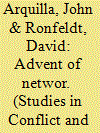

|
|
|
| 2 |
ID:
184806
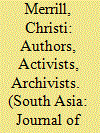

|
|
|
|
|
| Summary/Abstract |
In 2014, two sets of Dalit literature scholars based in the West started working on two different collaborative grant projects that announced themselves as ‘networks’: Nicole Thiara and Judith Misrahi-Barak received AHRC funding to organise a series of programmes for the Dalit Literature Network, and Christi Merrill and her colleagues at the University of Michigan received internal funding to develop a suite of digital tools called Translation Networks (TN). In this dialogue with Francesca Orsini, Merrill uses examples from the overlap between these two different networks to describe how the TN concept mapping tool helps users visualise underlying scholarly infrastructures they depend on and in the process disrupt many of the binaries and hierarchies built into conventional archiving tools.
|
|
|
|
|
|
|
|
|
|
|
|
|
|
|
|
| 3 |
ID:
176751
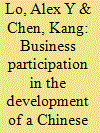

|
|
|
|
|
| Summary/Abstract |
Businesses are often involved in climate change governance and form networks to influence policy. They are evidently important for the implementation of market-based emission trading schemes and their general role has been widely discussed. However, there is a variety of business networks, and their specific structures and organizing styles are poorly understood, particularly in the non-Western context. This study identifies the ways in which one of these networks was organized and performed a governing function in the development of an emission trading scheme in China. We found that the policy development was neither highly top-down nor bottom-up, and business participation was hierarchical. Key governing roles were effectively performed by a small group of collaborating business organizations, which were essentially public-private hybrid actors and able to build linkages between the top and the bottom levels. The findings indicate the decisive qualitative differences in business leadership in the development of market-based policy.
|
|
|
|
|
|
|
|
|
|
|
|
|
|
|
|
| 4 |
ID:
133182
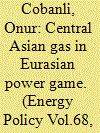

|
|
|
|
|
| Publication |
2014.
|
| Summary/Abstract |
Following the dissolution of the Soviet Union, various gas pipeline projects have been proposed to diversify transit routes and export markets of the landlocked Central Asian states. To evaluate the pipeline project's impact on the players' bargaining power, I apply the cooperate game theory to a quantitative model of the Eurasian gas trade and quantify the bargaining power structure via the Shapley value. Due to ample production capacities in Central Asia, I observe little strategic interaction between the West and China. Thus, demand competition with China is not necessarily a disadvantage for the West, and the Turkmenistan-China pipeline does not affect the impact of the westbound projects aiming Europe and Turkey. For Turkmenistan, i.e., the main supplier in the region, a link via the Caspian Sea to Turkey is the most beneficial westbound option. Although the projects carrying gas from Azerbaijan and Turkmenistan to Europe enjoy the European Commission's political support, they yield marginal benefits to the European consumers. Thanks to its transit position, Turkey collects a large share of the benefits in the East-West gas trade.
|
|
|
|
|
|
|
|
|
|
|
|
|
|
|
|
| 5 |
ID:
153313
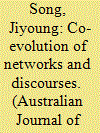

|
|
|
|
|
| Summary/Abstract |
This article uses an eclectic approach of network and discourse analyses to examine symbiotic relations between the formation of professional networks and the constitution of normative discourses in international affairs. Based on more than 2000 English and Korean mixed materials about the five most-mentioned North Korean defector-activists in the media in 1998–2015, and assisted by a computer-based content analysis tool, the author demonstrates how each of those five defector-activists has employed their endogenous identities to join the system of international human rights activism and offered legitimate narratives for the campaigns against North Korea, while forming transnational networks in South Korea, the USA and the UK. She argues that individuals’ endogenous identities and agency are critical for shaping normative discourses in international human rights activism against North Korea in the first instance, which then grow exponentially through transnational networks formed by individuals.
|
|
|
|
|
|
|
|
|
|
|
|
|
|
|
|
| 6 |
ID:
156816
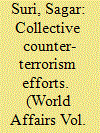

|
|
|
|
|
| Summary/Abstract |
Sagar Suri takes stock of the worldwide terrorist menace and its continuous evolution in the wake of technological advances. He highlights initiatives to combat nuclear terrorism and interstate strategies and reviews India’s policies in the Indian Ocean Region. He concludes by emphasising the need for a comprehensive, multi-disciplinary preventive campaign to discredit terrorist activities, going well beyond military operations.
|
|
|
|
|
|
|
|
|
|
|
|
|
|
|
|
| 7 |
ID:
099563


|
|
|
|
|
| Publication |
2010.
|
| Summary/Abstract |
The parallel development of the inter- and non-governmental Commonwealths on the one hand and the field of International Relations and its oldest journal, The Round Table, on the other, should not go unnoticed at the start of the second decade of the century. This article suggests that the Commonwealth nexus has always constituted a distinctive perspective and debate in both the metropole and the rest of the Commonwealth's expanding official and unofficial networks. The Commonwealth 'School' both reinforces and contrasts with other non-US and non-hegemonic approaches presently animating the field.
|
|
|
|
|
|
|
|
|
|
|
|
|
|
|
|
| 8 |
ID:
167415
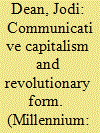

|
|
|
|
|
| Summary/Abstract |
This essay considers the political form that is presupposed in questions of resistance and revolution. It situates resistance and revolution in communicative capitalism, a setting characterised by intense winner-take-all inequality, the decline of symbolic efficiency, and the shift from the use to the circulation value of communicative utterances. It draws out the way that this setting inflects the body the question of resistance and revolution presupposes. Is it the world, the individual, the network, or the party? I argue that the party is the form we need to assume when we ask about revolution because it is the party that has the capacity to strategise, to plan and to arrange itself with an eye to revolution.
|
|
|
|
|
|
|
|
|
|
|
|
|
|
|
|
| 9 |
ID:
130689
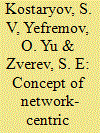

|
|
|
|
|
| Publication |
2014.
|
| Summary/Abstract |
The article discusses the U.S. commands' views on the significance of human factor in the battlefield as set out in the Joint Vision 2020 doctrine. Topics discussed include the high value on information in U.S. documents on military policy and warfare, role of high-tech weapons and information systems in military conflicts and the imperfections of technology. It also mentions the importance of effective leadership in contemporary system for educating and training of U.S. servicemen
|
|
|
|
|
|
|
|
|
|
|
|
|
|
|
|
| 10 |
ID:
108282
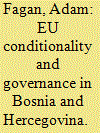

|
|
|
| 11 |
ID:
190400
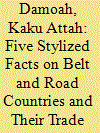

|
|
|
|
|
| Summary/Abstract |
The Belt and Road Initiative (BRI) offers investment opportunities for several Eurasian countries but not all of them attract investments in the same way. This paper investigates the geographical distribution of BRI projects completed between 2013 and 2020. The analysis shows that pre-existing trade patterns are related to the likelihood of a country receiving completed BRI projects. We single out and provide evidence in support of five stylized facts. First, BRI countries with completed projects tend to be poorer and larger. Second, projects are more likely to occur in countries with intense intermediate trade with China. Third, the countries that received projects have more diversified export structures and their sectoral specialization overlaps with that of China. Fourth, among middle-high-income countries, the allocation of projects tends to favor those with high levels of intra-industry trade. Fifth, among BRI countries with projects, the complexity or sophistication of the goods traded increases faster with income. These findings suggest that fostering trade integration has direct benefits and may also contribute to further BRI investments.
|
|
|
|
|
|
|
|
|
|
|
|
|
|
|
|
| 12 |
ID:
104690
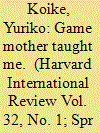

|
|
|
| 13 |
ID:
142529
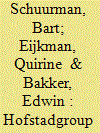

|
|
|
|
|
| Summary/Abstract |
Despite the Dutch Hofstadgroup's status in the literature as a prime example of a homegrown Salafi-Jihadist terrorist network, the authors, using newly available primary sources, argue that this classification is to a large extent unwarranted. The lack of a rudimentary organizational structure, the existence of divergent views on the legitimacy and desirability of political violence, and the absence of collective action in pursuit of a violent goal rule out labeling the Hofstadgroup as a terrorist organization or network for the largest part of its 2002–2005 existence. A smaller subgroup of extremists did begin developing into a proto-terrorist inner circle from late 2003 onwards. In 2004, this extremist core brought forth the murderer of filmmaker Theo van Gogh. But it was only in 2005, when the remnants of the inner circle tried to resuscitate the Hofstadgroup in the wake of the arrests that had followed Van Gogh's death, that these individual actions were replaced by the communal efforts necessary to warrant the “jihadist network” label often ascribed to the Hofstadgroup. Arguably the most archetypical aspect of the Hofstadgroup case is its ability to illustrate the deleterious effects of the ongoing scarcity of primary sources-based research on terrorism.
|
|
|
|
|
|
|
|
|
|
|
|
|
|
|
|
| 14 |
ID:
086261
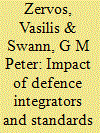

|
|
|
|
|
| Publication |
2009.
|
| Summary/Abstract |
This paper analyses the extent and character of product innovation in defence technologies where there are strong network effects, but where there is not a generally accepted system of open standards. Specifically, we examine the implications for innovation from the development of network-centric defence agencies accompanied by the creation of system integrators in the defence industry. The results show that although these developments are expected to have a number of positive impacts, such as enhanced security and gate-keeping of the relevant technologies, they are also likely to have an adverse effect on the available variety of new defence products.
|
|
|
|
|
|
|
|
|
|
|
|
|
|
|
|
| 15 |
ID:
166309


|
|
|
|
|
| Summary/Abstract |
Electric power distribution network charges have become a popular area of study for regulators, industry and academia. Increasing use of photovoltaics (PVs) and electric vehicles (EVs) by domestic customers has created concerns about the fairness of the current tariff structure. Proposing a tariff design, which will be cost reflective, transparent, sustainable, economically efficient is socially desirable. Wealth transfer through electricity distribution tariffs is a major concern for energy regulators. This paper aims to analyse the current distribution network tariffs faced by four main household customer groups in Great Britain (GB) - defined as those who own a PV and an EV, those with EV but no PV, those with PV but no EV and finally those with neither EV nor PV – under various uptake scenarios for EVs and PVs. We illustrate the impact on household tariffs for the most and least expensive GB network operators, namely London Power Networks and Scottish Hydro Electric Power Distribution. The results show that, due to the current network charges calculation structure, as PV penetration increases, the distribution tariffs increase for all customers regardless of whether someone owns a PV or not. On the other hand, as EV penetration increases, the distribution tariffs decrease for all customer groups. Another key finding is that the distribution tariffs in Great Britain are EV dominated and the future EV and PV penetration projections indicate that the distribution tariffs will likely decrease for all customers in Great Britain.
|
|
|
|
|
|
|
|
|
|
|
|
|
|
|
|
| 16 |
ID:
158650
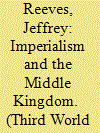

|
|
|
|
|
| Summary/Abstract |
This article applies the Nexon/Wright concept of ideal-type empire to the study of China’s post-2012 peripheral relations to demonstrate that the Xi administration is engaged in a concerted imperialist policy towards its developing neighbour states. Using the Nexon/Wright framework, the article demonstrates how the establishment of a China-centric regional network structure undergirds the Xi administration’s key foreign policy concepts and how these concepts, in turn, inform China’s bilateral relations with its peripheral states. To demonstrate how China employs imperialist tactics to its pursuit of a regionally based order, the article examines China’s bilateral relations with the developing states on its periphery: Mongolia, Kazakhstan, Tajikistan, Kyrgyzstan, Afghanistan, Pakistan, Nepal, Myanmar, Cambodia, Lao PDR and Vietnam.
|
|
|
|
|
|
|
|
|
|
|
|
|
|
|
|
| 17 |
ID:
137925
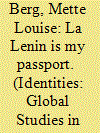

|
|
|
|
|
| Summary/Abstract |
Based on an ethnographic study of transnational networks of alumni of an academically selective boarding school in Havana, this article explores the nexus between mobility, schooling and belonging in the context of socialist Cuba and its diaspora. Drawing on Goffman’s work, I argue that the boarding school experience was transformative; it facilitated or consolidated social mobility for its pupils, which later, for many, led to geographic mobility in the form of study and work outside Cuba. After graduating, alumni continue to identify with the school and to reproduce their alumni identities. The affective webs of belonging forged through family links and friendships fostered at the school constitute emotionally sustaining networks that also provide material support after migrating. I propose that the school represents a site of identification for a globally dispersed non-national diaspora and argue that migration scholars need to embed international migration within people’s lives more broadly.
|
|
|
|
|
|
|
|
|
|
|
|
|
|
|
|
| 18 |
ID:
093825


|
|
|
|
|
| Publication |
2010.
|
| Summary/Abstract |
Today, analysts of the postmodern era recognize that worldwide conflicts are increasingly influenced by the interaction between terrorists, criminals, gangs, and private armies and that this interaction is a threat to the nation state. Now, a related threat is coming into play - one that involves all of these types of groups being represented at once in a single adversary. One such multifaceted group that is in the forefront is Los Zetas, a band of Mexican cartel enforcers that cannot be easily categorized, assessed, or targeted. Within broad categories of a multitude of irregular groups, Los Zetas embodies such capabilities as extensive compartmentalized networking, pervasive intelligence and counterintelligence capabilities, amassing of advanced weaponry, brutal tactics, top level military and police training, and the ability to undermine state governments and control large swaths of territory. Los Zetas, if left unchecked and unexamined, could potentially become a great security problem for Mexico, the US, and Central America. This essay provides an operational assessment that explores Los Zetas using various criteria traditionally used by nation state militaries, and more recently by Terrorism Early Warning Groups, to assess opposing forces (OPFOR). The purpose of this operational assessment is to provide a baseline understanding of Los Zetas that would make them less imposing and more targetable.
|
|
|
|
|
|
|
|
|
|
|
|
|
|
|
|
| 19 |
ID:
092005
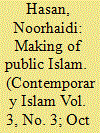

|
|
|
|
|
| Publication |
2009.
|
| Summary/Abstract |
Over the last three decades, Islam has demonstrated its vitality as a system of symbolic and collective identity that informs the social and political dynamics of Indonesian society. It was increasingly served as the most important frame of reference for many Indonesians to reflect upon the socio-political and cultural system they imagined capable of bringing about justice and attaining veritable development. Keeping pace with the growing influence of Islam among the emerging Indonesian Muslim middle class, it has even gradually emerged as a symbol of elitism, associated with the road to success.Its strength lies in the fact that it has developed into some sort of network that enables large numbers of people from different social background to share and make contacts, both real and virtual.Though this network, the Islamic revival messages have resonated loudly, influencing multiple social and political fields.The network, in turn, provides credible paths for upward mobility and also a market for commercial products.
|
|
|
|
|
|
|
|
|
|
|
|
|
|
|
|
| 20 |
ID:
109538
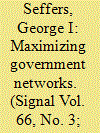

|
|
|
|
|
|
|
|